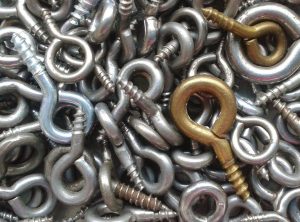
Not all bolts feature a traditional hex head. Some of them have a looped head. Known as eye bolts, they are designed to create an anchor point for ropes, cables or ties. You can install an eye bolt on just about any flat surface, after which you can run a rope or cable through the center of its head.
#1) Forged vs Bent Eye
Most eye bolts can be classified as either forged or bent eye, depending on how they are constructed. Bent eye bolts are constructed by bending an otherwise straight rod so that it develops a looped head. Forged eye bolts are constructed by shaping raw metal with heat and a hammer. When compared to bent eye, forged eye bolts are almost always stronger and more durable.
#2) Safe Working Load Limit
You should consider the safe working load limit when shopping for eye bolts. The safe working load limit is the maximum amount of weight that an eye bolt can support under normal operating conditions. While traditional bolts are typically used to hold two or more parts together, eye bolts typically are used to support an object. Before buying an eye bolt, check the safe working load limit. It should be greater than the weight of the object with which you intend to use the eye bolt.
#3) Length
Some eye bolts are longer than others. Whether forged or bent eye, you should consider the length. Eye bolts are driven into objects. They feature a threaded rod, which you can drive into a threaded hole. Longer eye bolts can be driven deeper into objects, resulting in greater security. But if an eye bolt is too long, you may accidentally drive it all the way through the object.
#4) Plain vs Shoulder Type
There are two primary types of eye bolts: plain and shoulder. Plain eye bolts have a smooth transition from the threaded rod to the looped head. Shoulder-type eye bolts have a groove where the threaded rod transitions to the looped head. The purpose of this groove is to catch the surface of the object with which the shoulder-type eye bolt is used.
#5) Tip
What type of tip does the eye bolt have? Most eye bolts have a flat, non-pointed tip resembling that of a traditional bolt. With that said, some of them have a pointed tip. Eye bolts with a pointed tip are also known as screw eyes. You can screw them into an object. Even if an object doesn’t have a pre-drilled hole, it may support a screw eye. Standard eye bolts, on the other hand, have a flat tip.
